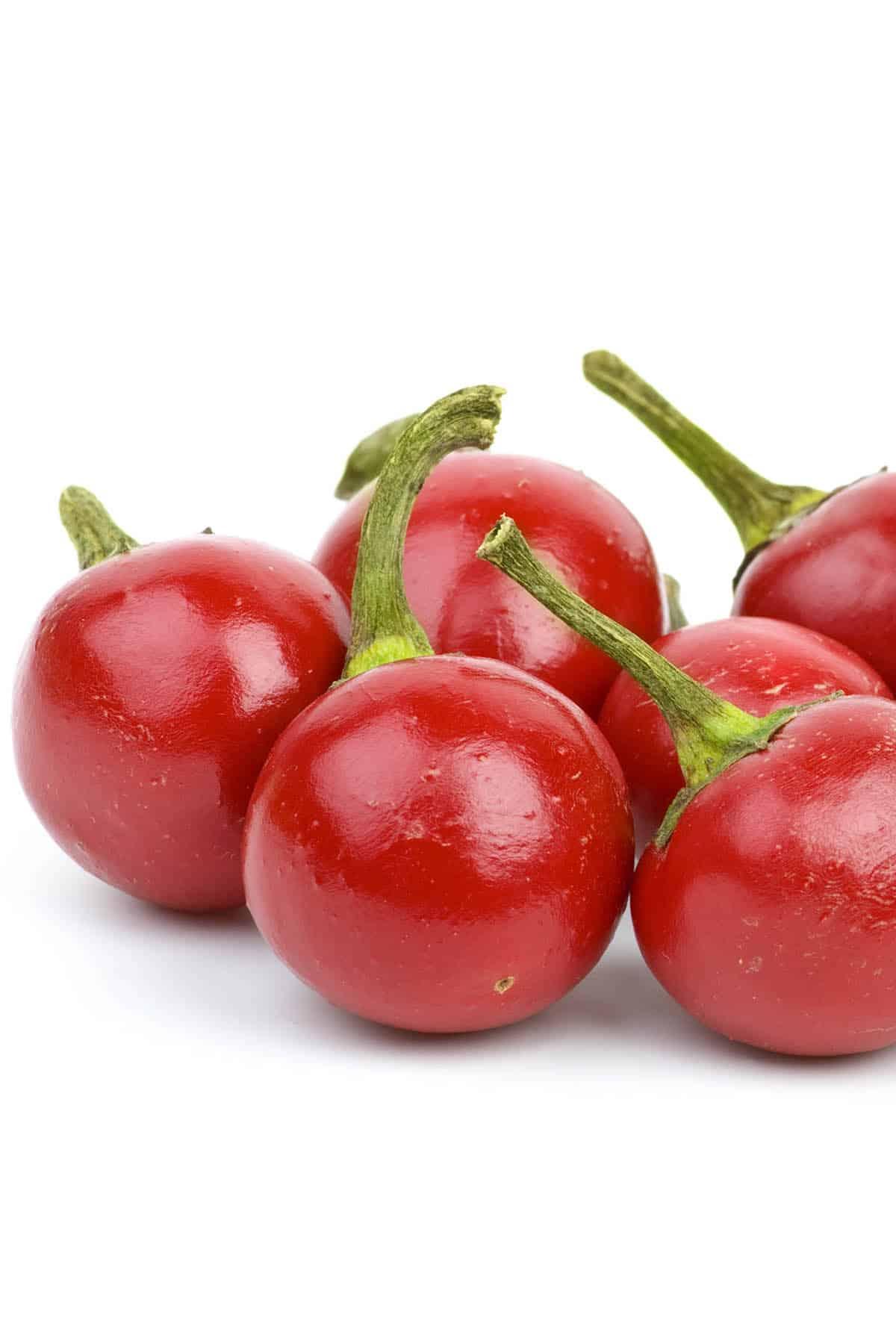Pimento peppers (aka pimiento pepper) are small heart shaped sweet peppers with a mild flavor and very little heat, commonly stuffed into olives and famous for pimento cheese. Learn more about them.

Scoville Heat Units: 100 – 500 SHU Capsicum Annuum
If you’ve ever tried southern pimento cheese, or enjoyed pimento stuffed green olives, you have already tried the pimento pepper in pickled form. The word “pimiento” translates to “pepper” from Spanish, but here we refer to a more specific pepper called the “pimento”.
The pimento pepper (often spelled pimiento) is also called the cherry pepper. It is a sweet pepper measuring 3-4 inches long and 2-3 inches wide with a bright red color and shaped like a heart.
You might be most familiar with the pimento as the famous pepper used to stuff olives.
Interestingly, both “pimento” from Portuguese and “pimiento” from Spanish derive from the Latin “pigmentum”, which means “pigment”. The word “pimento” became used as a sort of general term for peppers long ago and even more generalized to include black pepper.
What does a Pimento Pepper Taste Like?
Read more : Mary Berry(-ish) Cherry Bakewell Tart
Pimento peppers are not spicy, but rather mild, sweet and succulent. While they are typically pickled, they can also be enjoyed fresh from the garden. Use them as you might use red bell peppers, in foods requiring the Cajun Holy Trinity or perhaps a good sofrito recipe.
There are some varieties with heat, including the Santa Fe Grande and Floral Gem varieties. They are fun for stuffing, as they are good enough in size, and also great for dehydrating and grinding into chili powders.
In fact, the common spice, paprika, is made from dried pimento peppers and other other mild or sweet peppers.
How Hot is the Pimento Pepper?
Pimento peppers are some of the mildest peppers around, measuring only 500 – 1,000 Scoville Units on the Scoville Scale. Compare this with the popular jalapeno pepper, which measures in at 2,500 – 8,000 Scoville Heat Units, the hottest pimento would be about 5 times milder than an average jalapeno.
For heat and flavor comparison, see the Piquillo Pepper, which are different in shape, but similar in many other ways.
Cooking with Pimentos
As mentioned, pimento peppers are great for stuffing, pickling, drying and daily cooking, but I love them as well for sauces. Stuffed Pimento Peppers and Pickled Pimento Peppers are very popular and the most common recipes, but the most famous by far is southern pimento cheese.

Try some of these sauce or dip recipes with your harvest of pimentos.
- Pimento Cheese
- Muhamarra (Roasted Red Pepper and Walnut Dip)
- Romesco Sauce
- Peperonata Recipe
- Ajvar
- Sweet Roasted Red Pepper Sauce
What’s a Good Pimento Pepper Substitute?
Read more : Chicken Cordon Bleu
It depends on what you’re using them for. If you’re looking for pickled pimentos and can’t find them, you can use any other sweeter pickled pepper that you can find. Pickled red peppers would be ideal, but pickled green peppers are good, too.
Try pickling your own peppers for a quick fix.
For fresh pimentos, bell peppers are probably the easiest to find as a substitute, but any sweeter red pepper variety will do, such as the piquillo pepper, corno di toro pepper, or any Italian sweet pepper.
Mike’s Personal Experience
I’ve grown pimento peppers in our home garden and had no issues. The plants were not fussy and grew easily. They were somewhat productive and I was able to use the peppers in a variety of ways, from general daily cooking to stuffing or drying.
I even used some of them to make Patty a mild “hot” sauce that she used up pretty quickly.
Pimento Pepper Seeds
If you’re looking for seeds, check out my Chili Pepper Seeds resources page, or you can purchase pimento pepper seeds at Amazon (affiliate link, my friends!).
When to Pick Pimentos
You can normally find pimentos from late summer through early fall during growing season. Pick them when they are deep, deep red color and very firm to the touch. They can be stored or preserved like any other peppers.
NOTE: This post was updated on 2/1/22 to include new photo and information. It was originally published on 9/20/13.
Source: https://gardencourte.com
Categories: Recipe

